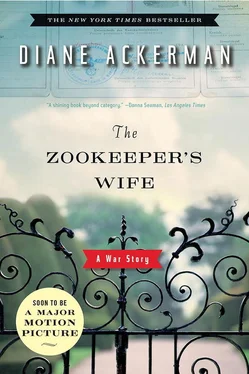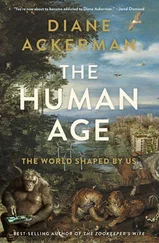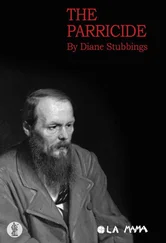On a typical summer morning, Antonina leaned on the wide flat ledge of the terrace wall, where apricot tiles, cold enough to collect dew, dampened the sleeves of her red robe. Not all the bellowing, wailing, braying, and rumbling around her originated outside—some issued from the subterranean bowels of the villa, others from its porch, terrace, or attic. The Żabińskis shared their home with orphaned newborn or sick animals, as well as pets, and the feeding and schooling of lodgers fell to Antonina, whose animal wards clamored to be fed.
Not even the villa’s living room was off limits to the animals. With its six tall window panels that could easily be mistaken for landscape paintings, the long, narrow salon blurred the boundaries between inside and out. Across the room, a large wooden credenza displayed books, periodicals, nests, feathers, small skulls, eggs, horns, and other artifacts on its many shelves. A piano stood on an Oriental rug beside a scatter of boxy armchairs with red fabric cushions. In the warmest corner, at the far end of the room, dark brown tiles adorned a fireplace and hearth, and the sun-bleached skull of a bison rested atop the mantelpiece. Armchairs sat beside the windows, where afternoon light washed in.
One journalist who visited the villa to interview Jan was surprised by two cats entering the living room, the first with a bandaged paw and the second a bandaged tail, followed by a parrot wearing a metal neck cone, and then a limping raven with a broken wing. The villa bustled with animals, which Jan explained simply: “It’s not enough to do research from a distance. It’s by living beside animals that you learn their behavior and psychology.” On Jan’s daily rounds of the zoo by bicycle, a large elk named Adam swayed close behind, an inseparable companion.
There was something alchemical about living so intimately with the likes of lion kitten, wolf cub, monkey toddler, and eagle chick, as the animal smells, scratchings, and calls mingled with human body and cooking smells, with human chatter and laughter in a mixed family of den-mates. At first a new member of the household slept or fed on its old schedule, but gradually the animals began to live in synchrony as their rhythms drew closer together. Not their breathing, though, and at night the sleepy tempo of breaths and snufflings created a zoological cantata hard to score.
Antonina identified with animals, fascinated by how their senses tested the world. She and Jan soon learned to slow around predators like wild cats, because close-set eyes give them pinpoint depth perception, and they tend to get excited by quick movements a leap or two away. Prey animals like horses and deer enjoy wraparound vision (to spot predators creeping up on them), but panic easily. The lame speckled eagle, tethered in their basement, was essentially a pair of binoculars with wings. The hyena pups would have spotted Antonina coming in total darkness. Other animals could sense her approach, taste her scent, hear the faintest swoosh of her robe, feel the weight of her footsteps vibrating the floorboards a whisker’s worth, even detect the motes of air she pushed aside. She envied their array of ancient, finely tuned senses; a human gifted with those ordinary talents, Westerners would call a sorcerer.
Antonina loved to slip out of her human skin for a while and spy on the world through each animal’s eyes, and she often wrote from that outlook, in which she intuited their concerns and know-how, including what they might be seeing, feeling, fearing, sensing, remembering. When she entered their ken, a transmigration of sensibility occurred, and like the lynx kittens she hand-raised, she could peer up at a world of loud dangling beings:
…with legs little or large, walking in soft slippers or solid shoes, quiet or loud, with the mild smell of fabric or the strong smell of shoe polish. The soft fabric slippers moved quietly and gently, they didn’t hit the furniture and it was safe to be around them… calling “Ki-chi, ki-chi,” [until] a head with fluffy blond hair would appear and a pair of eyes behind large glass lenses would bend over…. It didn’t take long to realize that the soft fabric slippers, the blond fluffy head, and the high-pitched voice were all the same object.
Often dabbling in such slippages of self, aligning her senses with theirs, she tended her wards with affectionate curiosity, and something about that attunement put them at ease. Her uncanny ability to calm unruly animals earned her the respect of both the keepers and her husband, who, though he believed science could explain it, found her gift nonetheless strange and mysterious. Jan, a devout scientist, credited Antonina with the “metaphysical waves” of a nearly shamanistic empathy when it came to animals: “She’s so sensitive, she’s almost able to read their minds…. She becomes them…. She has a precise and very special gift, a way of observing and understanding animals that’s rare, a sixth sense…. It’s been this way since she was little.”
In the kitchen each morning, she poured herself a cup of black tea and started sterilizing glass baby bottles and rubber nipples for the household’s youngest. As zoo nurse, she was lucky enough to adopt two baby lynxes from Białowieża, the only primeval forest left in all of Europe, an ecosystem Poles called a puszcza, a word evoking ancient woodlands undefiled by human hands.
Straddling what is now the border between Belarus and Poland, Białowieża unites the two at the level of antler and myth, and traditionally served both countries as a famous hunting retreat for kings and tsars (who kept an ornate lodge there), which, by Antonina’s time, fell under the purview of scientists, politicians, and poachers. The largest land animals in Europe, European (or “forest”) bison, sparred in its woods, and their decline helped to kindle Poland’s conservation movement. As a bilingual Pole born in Russia who returned to Poland, she felt at home in that green isthmus linking different regimes, walking in the shade of trees half a millennium old, where the forest closes in, intimate as a tick, one fragile, fully furnished organism with no visible borders. Pristine acres of virgin forest, declared untouchable, create a realm that airplanes overfly by miles lest they scare the animals or taint the foliage. Looking up through the open parachutes of treetops, a visitor might spy a distant plane banking like a small silent bird.
Though outlawed, hunting still existed, leaving motherless young animals, the rarest of which usually arrived at the zoo in a crate marked “live animal.” The zoo served as lifeboat, and during April, May, and June, the birthing season, Antonina expected crotchety offspring, each with its own special diet and customs. The month-old wolf cub would normally be tended by its mother and family members until two years old. The clean, sociable baby badger responded well to long walks and dined on insects and herbs. Striped wild boar piglets did justice to any table scraps. A red deer fawn bottle-fed until midwinter and skidded, splay-legged, on wooden floors.
Her favorites were Tofi and Tufa, the three-week-old lynx kittens, who needed bottle-nursing for six months and weren’t really self-reliant for a year or so (and, even then, they liked walks on a leash down Praga’s busiest street, while passersby gaped). Because so few wild lynxes remained in Europe, Jan went to Białowieża himself to fetch the kittens, and Antonina offered to raise them inside the house. When his taxi arrived at the main gate one summer evening, a guard ran to help Jan unload a small wooden box and together they carried it to the villa, where Antonina eagerly waited with sterilized glass bottles, rubber nipples, and warm formula. As they lifted off the lid, two tiny speckled fur balls stared up angrily at the human faces, hissed, and began biting and scratching any hand that reached for them.
Читать дальше












